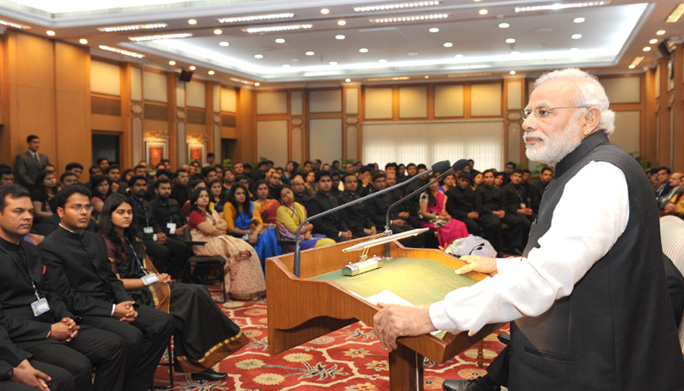In yet another big reform, the Modi government has introduced the ‘lateral entry’ scheme, whereby it has invited applications for ten posts of joint secretaries in different ministries under the central government. The candidates applying under the scheme must be of 40 years of age as on July 1 and must have graduated from a recognized university or institute. They are to be appointed for a period of three years initially and the government can extend the contract upto five years. The candidates selected for the prospective posts, will be offered a salary between Rs. 1.44 lakh to Rs. 2.18 lakh per month. They will also be entitled to allowances and facilities which are applicable to government officials working at an equivalent level under the government of India.
The posts for which the government has issued advertisements are revenue, financial services, economic affairs, agriculture, road transport, shipping, environment and forest, civil aviation and commerce. It has been specified that officers of a state/ union territory who are working at an equivalent level or are eligible to be appointed at an equal level in their cadre, or individuals working at comparable levels in public sector undertakings, autonomous bodies, recognised research institutions with a minimum fifteen years experience can apply. Similarly, individuals working at comparable levels in private sector companies are also eligible to apply for these posts.
The circular issued by the Department of Personnel and Training (DoPT) has stated the objective of the government behind the lateral entry scheme. It states that, “The Government of India invites talented and motivated Indian nationals willing to contribute towards nation building to join the government at the level of Joint Secretary.” Therefore, it is clear on the face of it that the Modi government has firmly resolved to take administrative efficiency onto a new level through the lateral entry scheme. PM Modi has always laid stress on bureaucratic reforms and efficiency in governance as well as policy-making. This move demonstrates how the Modi government is living upto its promises. It is true that the IAS and other civil service cadres consist of several hard-working and capable individuals but it is also true that it is also prone to lethargy, inefficiency and corruption. Till now, there was no competition to the Indian bureaucracy. It allowed the bureaucrats to be complacent at times. We can vote out an inefficient government but the bureaucrats are there to stay in the long run. Now, the lateral entry scheme which had been recommended by a committee of secretaries as well as the NITI Aayog, will put pressure on the existing bureaucracy driving it to improve its performance record.
The primary reason why lateral entry to the IAS is critical is this: the IAS, while it has many hardworking and good people, is also the den of enormous lethargy, obstinacy and corruption. We can vote out netas but the babus are impossible to fire. The system needs a shake-up.
— HindolSengupta (@HindolSengupta) June 10, 2018
While the Modi government has introduced yet another administrative reform, the Congress and similar minded opposition parties are showing no signs of rising above party lines. They have continued with their ugly political remarks and have politicised even this commendable reform. The Rahul Gandhi of RJD, Tejashwi Yadav, alleged that the lateral entry scheme is “unconstitutional” and “anti-reservation”. He also alleged that tomorrow the government will appoint prime minister and cabinet ministers without holding polls. One doubts if even he can understand and explain how his statement makes any sense. Another opposition leader, CPM supremo Sitaram Yechury has called thie an attempt to subvert SC, ST and OBC reservations. How can appointments at such a high level at an age of more than 40 years be detrimental to reservations? Remember, reservations in the UPSC civil services have been left untouched. This is not even remotely connected to SC/ST reservations. The Congress went a step further in this intellectual bankruptcy and announced that it will challenge this decision before the courts as being undemocratic.
With this illegitimate and uncalled for criticism, the opposition has made it clear that it is only the BJP which cares for administrative efficiency and better governance. On the other hand, the entire opposition is narrow minded and cannot think above vote bank politics. In the run-up to the 2019 elections, the contest will be between PM Modi representing efficiency and growth-centred politics opposed by an array of parties adamant on allowing growth and progress to perish in face of lethargy, complacency and inefficiency.
